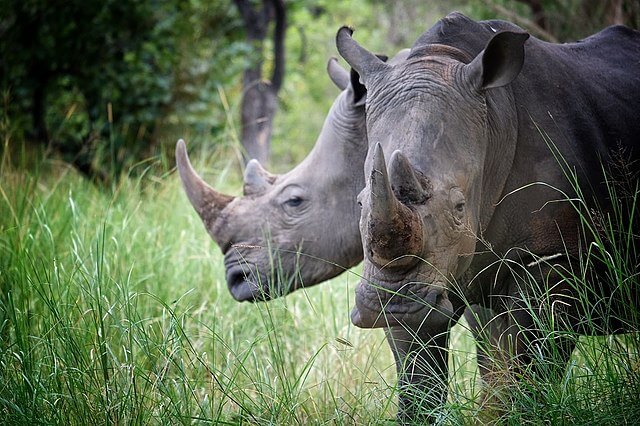
Originally published on 15th November 2023, this article has been updated on 13th January, 2024 to reflect the latest research and statistics.
Recent figures offer hope for the rhino, with global rhinoceros populations rebounding despite continued threats from poaching and habitat loss.
While these majestic creatures numbered around 500,000 in Africa and Asia during the 20th century, their populations have since suffered dramatic declines. However, there is now evidence of a resurgence in some areas, marking the first positive signs in a decade.
According to the International Rhino Foundation, the global rhino population stood at 27,431 by the end of 2022. Notably, the southern white rhino population saw its first increase since 2012, growing from 15,942 in 2021 to 16,803 in 2022. In 2021, the global rhino population was estimated to be 26,272.
Black rhinos, primarily found in eastern and southern Africa, have been targeted by poachers for their valuable horns. Nevertheless, in the past year, their numbers increased by nearly 5%, rising from 6,195 in 2021 to 6,487 in 2022. This growth is particularly remarkable considering the continued threat of poaching. Conservationists played a crucial role in establishing new populations that have successfully expanded.
“With this good news, we can take a sigh of relief for the first time in a decade,” said Dr Michael Knight, the chair of the IUCN rhino group. “It is imperative to further consolidate and build on this positive development and not drop our guard.”
However, not all species of rhinos are experiencing such positive trends. The Javan and Sumatran rhinos, both critically endangered, face a grim outlook. Their populations have been steadily declining, and they are on the brink of extinction.
Officially, around 80 Sumatran rhinos are known to exist, but experts fear that there may be as few as 34, often in isolated pockets of forests where they struggle to find mates and breed. In a rare piece of good news, a female Sumatran rhino was born in captivity in Indonesia in March of the previous year after several miscarriages.
While there has been some improvement, the threat to rhinos remains substantial. In 2022, 561 rhinos were poached in Africa, an increase from 501 in 2021 and 503 in 2020. These numbers are still concerning, but they represent a decrease from the peak of the crisis in 2015 when a staggering 1,349 African rhinos fell victim to poaching, following a substantial increase in killings since the early 2000s.
“We are reassured to see long-term investment into collaborative conservation actions result in increased numbers of white, black and greater one-horned rhinos,” said Dr Jo Shaw, the CEO of Save the Rhino International. “Similar interventions must be amplified to continue to address the critical situation facing Javan and Sumatran rhinos. We remain steadfast in our commitment to the future of all five rhino species.”
India and Nepal are home to stable populations of greater one-horned rhinos, numbering around 4,000. Despite this stability, conservationists remain vigilant about the persistent threats of poaching and habitat loss in the region.
The Javan rhino population, with just 76 individuals, all residing in Indonesia’s Ujung Kulon National Park, is teetering on the brink of extinction. Alarming signs of illegal activities in the area add to concerns about the future of these rhinos.
——————————————————————————
At Natural World Fund, we are passionate about stopping the decline in our wildlife.
The decline in our wildlife is shocking and frightening. Without much more support, many of the animals we know and love will continue in their decline towards extinction.
When you help to restore a patch of degraded land through rewilding to forests, meadows, or wetlands, you have a massive impact on the biodiversity at a local level. You give animals a home and food that they otherwise would not have had, and it has a positive snowball effect on the food chain.
We are convinced that this is much better for the UK than growing lots of fast-growing coniferous trees, solely to remove carbon, that don’t actually help our animals to thrive.
This is why we stand for restoring nature in the UK through responsible rewilding. For us, it is the right thing to do. Let’s do what’s right for nature!
Donate today at https://naturalworldfund.com/ and join in the solution!

